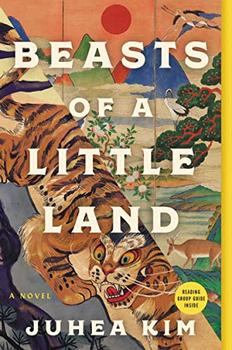Summary | Excerpt | Reviews | Beyond the Book | Readalikes | Genres & Themes | Author Bio

A Novel
by Juhea Kim
His father had also been a soldier under the PyongYang magistrate. Whenever they skipped paying the army, his father had gone into the mountains. Most often he'd brought back small game—deer, hares, foxes, and pheasants—though sometimes boars, black bears, leopards, and wolves.
When he was a child, his father had killed a tiger by himself, and six of the village's strongest men had to come help him carry the beast down the mountain. The rest of the villagers surrounded them in solidarity while the children ran ahead of the crowd, cheering. A tiger skin was worth more than a soldier's yearly wage. Its massive body was laid to rest in the village square under the ginkgo tree, and somehow the women prepared a feast out of nothing—that was their talent—and everyone drank their fill of the milky rice wine.
But later that night, sitting cross-legged on their hot-stone floor, his father turned grave. Never kill a tiger unless you have to, his father said sternly.
But Father, we are rich now. We'll be able to buy all the rice we need, he said. The stub candle was flickering modestly, without defying the darkness that protected them all like a thick winter quilt. His mother and younger sisters were either sewing or asleep in the other room, and there was only the murmurous sound of owls on their hunt.
His father just looked at him and said, You've been shooting hares and pheasants since you were a child.
Yes, Father.
You can take down a pheasant flying a hundred yards away.
Yes, Father, he said proudly. Already there was no better archer than him in the entire village, except for his father.
You can shoot an arrow into a tree from a hundred and twenty yards away, and shoot another one right on top of it.
Yes, Father.
So do you think you can kill a tiger? his father asked. He wanted to say Yes, and he did think he could. But his father's voice as he asked the question already foretold him that the only right answer was silence.
Show me your bow, his father said. He got up and brought his bow and laid it on the floor between them.
You can't kill a tiger with this bow no matter how good of a marksman you are, his father said. It's not powerful enough at a long distance, and a tiger is no pheasant. This bow can only carry enough force to wound a tiger if you shoot from twenty yards or under. To fatally wound, fifteen yards or less. Do you know how quickly a tiger can cross fifteen yards?
He admitted his ignorance with silence.
A tiger is three yards from nose to the tip of its tail, and can jump over the village tree if it wants to. To a tiger, leaping over this cottage is like skipping over a puddle to you and me.
If you take a shot at the tiger too soon, you'll only injure it lightly and make it more ferocious. Take a shot too late or miss, the tiger will be upon you before you finish blinking your eyes. A tiger can cross fifteen yards in a second.
But, Father, he said. You killed a tiger today.
I told you, kill a tiger if you have no other choice. And that's only when the tiger tries to kill you first. Never go after a tiger otherwise, do you understand?
* * *
THE HUNTER'S MEMORIES GATHERED SOFTLY like the snow falling around him. He hid himself behind a rock, facing out toward the ledge. His senses were dulled by the snow, which was swirling into his eyes and nose and crusting over his bare hands. It was coming down heavier than he'd thought—and from this height, with the clear view of the clouds blowing in from the east, he could see it wouldn't stop. He realized that he should have gone down the mountain the moment he first smelled the snow coming, when he stopped over that wet paw print.
He hated seeing his children staying so still and quiet inside the cottage, drained of the strength to even chatter. He had promised them that he would come back with something to eat. If only he'd caught a deer or a rabbit, he would have gone home to them and seen their small happy faces lit brightly like lanterns. Instead, he found only the leopard's footprint and was tempted by the possibility of its hide, worth more than half of a year's harvest.
Excerpted from Beasts of a Little Land by Juhea Kim. Copyright © 2021 by Juhea Kim. Excerpted by permission of Ecco. All rights reserved. No part of this excerpt may be reproduced or reprinted without permission in writing from the publisher.
Your guide toexceptional books
BookBrowse seeks out and recommends the best in contemporary fiction and nonfiction—books that not only engage and entertain but also deepen our understanding of ourselves and the world around us.